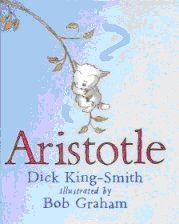What shall we do with all our leisure? Keep busy!
Then there is Aristotle the Kitten. And Socrates versus Aristotle at
And Socrates versus Aristotle at
http://video.google.com/videoplay?docid=7517643435044704244&q=aristotle&hl=en
Not only has Aristotle been recruited into romain policier, he has also been co-opted to management fads If Aristotle Ran General Motors (1998) by Tom Morris at http://www.amazon.com/If-Aristotle-Ran-General-Motors/dp/0805052534
If being a critic of democracy was not enough, Aristotle also justified slavery. All the Greeks found slavery justified, but Aristotle is explicit and this, too, alienates students. About the only way to get some purchase here is to compare with how we treat the mentally ill, or to make some crude Marxist comparisons to wage slaves. I’ve never have had much luck in getting the benefit of the doubt for Aristotle on this one.
But slavery was necessary to secure a leisured life style for that tiny portion of the population who are citizens. If we all stand up, we can find out who is a citizen. It’s a game that makes a point. Sit down if you were not born in Sydney. Sit down if both of your parents were both not born in Sydney. Sit down if you are under the age of thirty. Sit down if you are a woman. Sit down if don’t own a farm. (There may be some other steps which I have forgotten.) What is left is a few men. Their wives run the family and they have the leisure to devote to politics and the arts. Or drinking all day. Aristotle has long been excoriated by feminist for his analysis of the relationship of men and women, when he should be praised for making it explicit. In the end, he is never credited with the conclusion that the relationship of men and women is a “royal relationship,” which means by implication a relationship of different but equals.
What would intelligent people with material needs met and so having leisure do with their time and lives. When automation began in large scale after World War II, some Western Societies worried about how they would live when there was material plenty and we did have leisure. The Twentieth Century Fund commissioned Sebastien de Grazia to study the question, and he published Of Time, Work, and Leisure (1962). It is a good book but not much of a guide to today. That day has not yet dawned. We are all too busy these days to dream about what we would do with leisure, so it is hard to imagine what we would do. We can find a few hints in the work of the dream merchants we employ. The advertisers. The images they project of freedom, say on vacation or after having won a billion on the lottery, or after retirement all emphasise doing what one wants, when and how one wants. It is like a life pursuing a hobby or hobbies. So the men play golf and drink beer with each other, and the women swim and play with (grand) children. The locale is usually some place tropical. Sunshine and air conditioning. But Aristotle’s question is, if I have a well provided for leisure what should I do with myself? And surely the answer is not fish all day. Check it out for yourselves.
Or with leisure would we be cruel like Star Trek’s Plato’s Step Children? Aristotle gets vague on this. A very simple exposition of Aristotle on happiness is Jean Vanier, A Guide to the Good Life: Happiness, Aristotle for the New Century (2001).
One thing is sure, they would have plenty of time for political theory. Aristotle says it all when he says that they would definitely not do anything that had any practical impact on the world. None what so ever. The importance of theory is precisely because it is good for nothing in this world. It is higher, better than the world.
To be continued.
